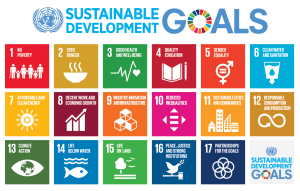by Michelle Nelson von Euw
As the five-year anniversary of the Sustainable Development Goals (SDG) agenda approaches, many nations are beginning to assess whether and how they are achieving these targets and indicators set by the United Nations. To summarize, the Sustainable Development Goals (SDGs) is a collection of 17 international development objectives set by the United Nation’s General Assembly in 2015 for the year 2030. The development problems addressed by the 17 SDGs range from improving general well-being, education, and clean water practices to combating poverty, hunger, and detrimental climate change. The 17 SDGs are monitored by 169 targets. Within each target exists one to three indicators, which are used to monitor success and evaluate whether the targets are met. The ultimate goal of the SDGs, as outlined, is universal progress toward a more equitable and sustainable world.

Source : The United Nations Sustainable Development Goals
Last year, the United Nations released a Voluntary National Review on their SDG Knowledge Platform outlining Niger’s progress within the SDG framework as well as a commitment from the country to submit an additional report in 2020. The report focused specifically on the programs that have either already spurred progress toward the SDGs or were recently implemented. At the core of Niger’s success is the Economic and Social Development Plan (PDES) 2017-2021, which focuses on 43 of the 169 targets and 66 of the 232 indicators outlined in the SDGs. This program was designed with the goal of creating a well-governed country built on equality and a sustainable economy. Through this program, access to water and sanitation services has improved on a national level, moving the country closer to accomplishing SDG 6: Clean Water. Unfortunately, however, there is still a disparity between urban and rural areas in the use of basic sanitation services. With the continued support of government programs, the Republic of Niger hopes to rectify this by their next reporting period of 2020.
The PDES outlined improvements for two of the SDGs. For SDG 11: Sustainable Cities and Communities, the PDES suggested improving living conditions for urban populations through strengthening waste management and counter-pollution programs. For SDG 12: Responsible Consumption and Production, the PDES recommend adopting a decade long framework dedicated to cultivating a culture of responsible consumption of resources and energy. This framework also ensures that any waste resulting from these consumption or production processes is minimal. In an effort to reach more targets and indicators for SDG 7: Affordable and Clean Energy, Niger adopted a National Renewable Energy Action Plan which aims to reduce the use of biomass as a central energy source and to shift to clean fuels and technologies.
While there is still a great deal of improvement to be made before the 2030 deadline of the Sustainable Development Goals, the Republic of Niger has made great strides toward creating a more sustainable environment for its citizens through the effective use of government programs. The Voluntary National Review 2020, when released, will indicate just how successful these programs have been.
References:
“Social and Economic Development Plan.” Niger Renaissance Conference,


